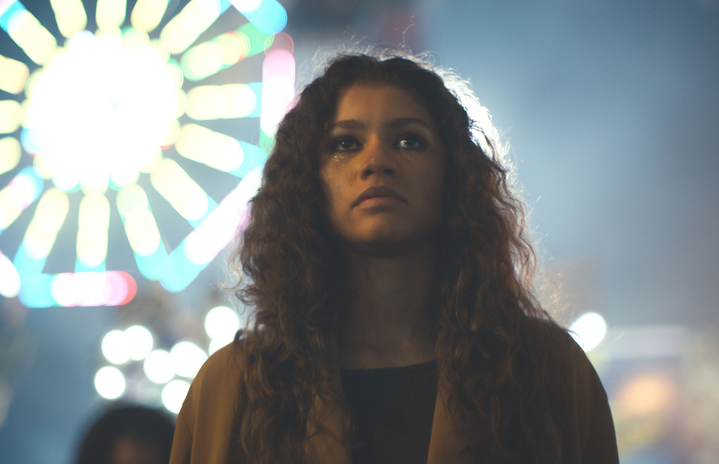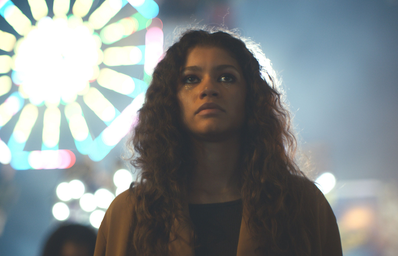First of all, this article will contain spoilers if you have not finished watching season two of Euphoria.
With that being said, this season of HBO Max’s Euphoria has been jam-packed with action and has answered just as many questions as it has raised. Written by Sam Levinson and produced in partnership with A24, Euphoria has become known for its stunning cinematography, vibrant makeup, hit soundtrack, and, of course, its drama.
For the past few weeks, Euphoria has become somewhat of a weekly ritual as people congregate around the TV Sunday night, break down the episode with friends the following day, and theorize what will happen as next Sunday approaches. Along with each episode came a plethora of critiques, commentaries, and conspiracy theories on the internet, some of which were fun and thought-provoking, but many of which were questionable and misinformed. In this article, I will unpack the events of the season finale and address some of the online discourse surrounding season two.
Starting off the episode at Fezco’s house, the reason behind the empty seat at Lexi’s play becomes increasingly apparent. Custer, secretly working with the police, announces that the “cops found Mouse’s body” in hopes of eliciting a confession. At that moment it is finally revealed where Faye’s loyalties lie as she drops her glass in order to signal to Fez to remain quiet. Continuing to help Fez, Faye fabricates a lie and feigns confusion to throw off Custer and the police. Unable to pick up on the cues of the situation, Ashtray kills Custer.
I think that this scene really emphasizes that Ashtray is still just a child despite Fez’s previous claim that Ashtray is “not a kid” but his “business partner”. Ashtray’s irrational, violent tendencies throughout the season, which have culminated into this fatal mistake, reveal how the traumatic environment in which he grew up has affected him. Like a pit bull raised in an abusive atmosphere, Ashtray is aggressive with most everyone around him and will do anything to protect Fez, the one person who has been there for him unconditionally.
Meanwhile at the play, Cassie flies completely off the rails after Nate ends things with her. Determined to ruin Lexi’s play, Cassie marches on stage and begins to clap in a manner that appears to attempt to imitate Maddy’s infamous carnival scene at the Jacobs’ chili booth. She goes on a rant against Lexi that ends up humiliating no one but herself. In my opinion, Cassie shouting “Well if that makes me a villain, then so f***ing be it” to the entire theater came off as a bit cheesy, but perhaps that was intentional to show how unfitting it is for Cassie to try to act in a Maddy-like manner. This would make sense given Cassie’s desperate efforts to imitate Maddy in order to capture Nate’s attention in previous episodes. Although Maddy intended to take a non-violent approach to Cassie’s betrayal, Cassie’s actions on stage provoke Maddy to finally take action: the moment we have all been waiting for ever since the New Year’s Eve party. Chasing Cassie off the stage, Maddie slaps her and shoves her face-first into a wall.
The scene switches to a very wholesome interaction between Rue and Elliot a few days prior. Rue shows up to Elliot’s house to thank him for saving her life by snitching on her. Her ability to give and accept apologies shows her effort to take proactive measures towards her recovery. A lot of hate towards Elliot has circulated the internet, and while I agree that his actions with Jules were immoral, I think that this scene truly showcases the goodness of his character. Choosing to remain distant from Rue (at least for now) was a mature and selfless decision, as he knows that neither of them can remain sober while the other is using. Although Elliot’s song received a flood of criticism for being too long, I personally found it to be quite beautiful and fitting to their relationship with each other and with substances.
Returning back to the play, Lexi decides that the show must go on despite the disastrous interruption. Apologizing to the audience for the “technical difficulties,” Lexi recounts a conversation she had with a friend about her play; she asked him “What if I upset people?” to which he replied “Sometimes people need to get their feelings hurt”. Knowing that the “friend” to which she alludes is Fezco adds to the situation’s tragedy. This unlikely duo has captured the hearts of viewers throughout the season and the transition in shots between the play and Fez’s house makes the episode all the more heartbreaking.
Back at Fez’s house, the police break down the door, leading to a tragic showdown between the police and Ashtray, resulting in Ashtray being shot right in front of Fez’s eyes. This scene was brutally hard to watch as the wounded Fezco lies helplessly on the floor, calling out Ash’s name in agony.
Despite this tragedy, the finale ends on a relatively optimistic note in regards to Rue’s addiction as she rekindles her relationship with her childhood best friend Lexi, an undoubtedly positive influence in her life. As the show concludes, Rue’s narration reveals that she stayed clean for the remainder of the school year, although it is unclear if she will be able to maintain sobriety in the long run.
I think one of the greatest achievements of season two is that, unlike the first season, it is very clear that the show does not glamorize addiction. I think that the shift from season one into season two mimics the development of addiction in itself. It is not always apparent to the addict or to the addict’s loved ones how bad their condition is until it is too late, as exemplified by the oblivion of Leslie, Gia, and Jules to Rue’s relapse. For those who have addicted loved ones, it is much easier to view them with rose-colored glasses and remain in denial. I feel that a lot of the criticism directed towards this season stems from a lack of understanding of the nature of addiction. Zendaya put on a spectacular performance showcasing the brutal reality of substance abuse. An addict will do and say anything to get their next fix and can switch from brutally berating the people they love to weeping for forgiveness in just an instant. One thing that I loved about Lexi’s play was how it was able to provide Rue with a perspective of herself other than her own. Being Rue’s childhood best friend, Lexi views Rue with love and empathy for all she has gone through. This comes as an immense relief to Rue who has been locked inside her own head, only able to think of herself as a bad person. The play allows her to see herself as a human who is vulnerable to making mistakes as she copes with the loss of her father.


